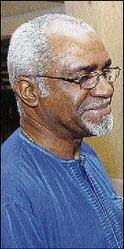Robinson blazes trail in international law
Published: Tuesday | August 18, 2009

Patrick Robinson
On Sunday, Patrick Robinson put away his legal documents and settled in at the Olympic Stadium in Berlin, Germany, to indulge in one of his great passions: track and field.
He watched sprinter Usain Bolt scorch the track to post an amazing 9.58-second world record for the 100 metres at the World Championships.
Later this month, the 65-year-old Robinson will have his share of international attention as president of the International Criminal Tribunal for the former Yugoslavia (ICTY) at The Hague in The Netherlands.
He is the presiding judge in the trial of Radovan Karadzic, who, starting August 29, will plead his case against war-crime charges for the deaths of thousands of Bosnian Muslims and Croats.
Robinson, who has been a judge at the tribunal since 1998, was recently awarded the Order of Jamaica for his groundbreaking work in international law.
Presiding judge
He was also presiding judge for the trial of the former Serbia and Yugoslav president, Slobodan Milosevic, who was being tried for war crimes committed during years of bloody ethnic conflict in Croatia, Bosnia/Herzegovina and Kosovo.
Milosevic died while in custody at The Hague in March 2006.
Robinson was appointed president of the ICTY in November 2008. He rates the trial as the most challenging of his career.
"Milosevic's death ended the trial just three weeks before it was scheduled to be concluded. His untimely passing deprived both the victims and him of a verdict on the allegations in the indictment against him," Robinson told The Gleaner last week.
"Many witnesses were called, a total perhaps of about 500, by both the prosecution and the defence," Robinson added. "Mr Milosevic defended himself, and the question as to whether he had a right to defend himself was one of the many interesting legal issues in the case."
Robinson was named head of the ICTY 40 years after he began his career in international law. He says the profile of representatives in this field has been transformed significantly since the Nuremburg and Tokyo trials against the Nazis and Japanese, following World War II.
In 1968, when Robinson began practising, he was one of only two Jamaicans qualified as international lawyers. That, too, has changed.
"In the past 40 years, developing countries have had to train personnel in international law to match the expertise of personnel in developed countries," he said. "When I started, there were perhaps no more than one or two persons in Jamaica, and perhaps no more than six in the entire Caribbean, working in the area of international law. Today, the Attorney General's Department and the Ministry of Foreign Affairs have several lawyers working in international law."
Robinson believes this growth is significant.
"Lack of expertise in this area will adversely affect Jamaica's growth and development," he said.
Robinson was born in Sheffield, Westmoreland, where his father, Rudolph Robinson, a teacher and lay preacher, was an activist for the People's National Party (PNP). His mother, Clarice, was the district's post mistress.
Education
Robinson attended Jamaica College, then the University College of the West Indies where he earned a degree in English, Latin and economics.
While studying law at London University in England during the mid-1960s, Robinson bought Oppenheim's International Law, a book that defined his career path.
After three years (1968-71) as a Crown's counsel at the Office of the Director of Public Prosecutions, Robinson returned to London University where he completed a degree in international law.
Back in Jamaica, he held senior posts in the Ministry of Foreign Affairs and the Attorney General's Department before accepting a job with the Inter-American Commission on Human Rights, where he stayed for eight years.
His tenure at The Hague followed. It has been an eye-opener.
"At our tribunal, we are faced with a vast multitude of victims and witnesses who want to tell their story. The most negative aspect of my work is hearing evidence that provides the worst imaginable illustration of man's inhumanity to man," he said.
Patrick Robinson is also a sports enthusiast who has written two books on Jamaican athletics. He is the father of three children. The youngest, Julian, is deputy general secretary of the PNP.
His sister, Heather Robinson, is a former PNP parliamentarian.








